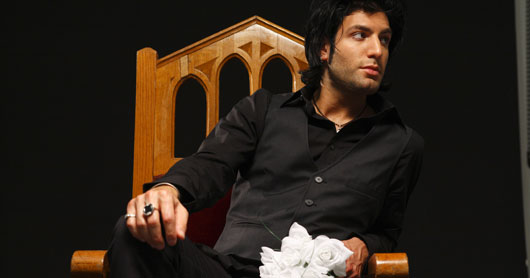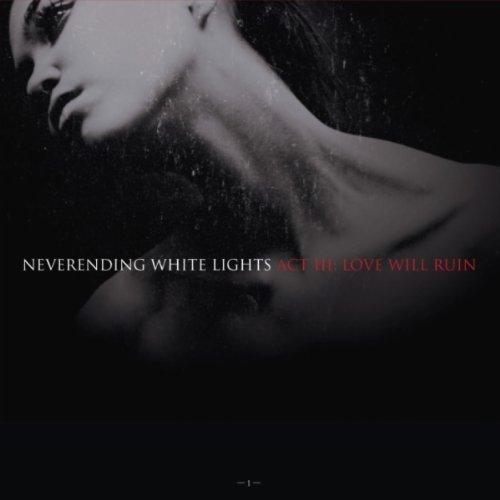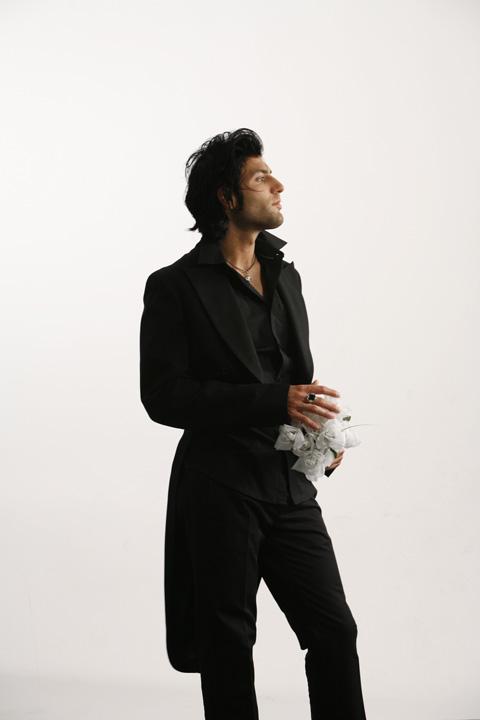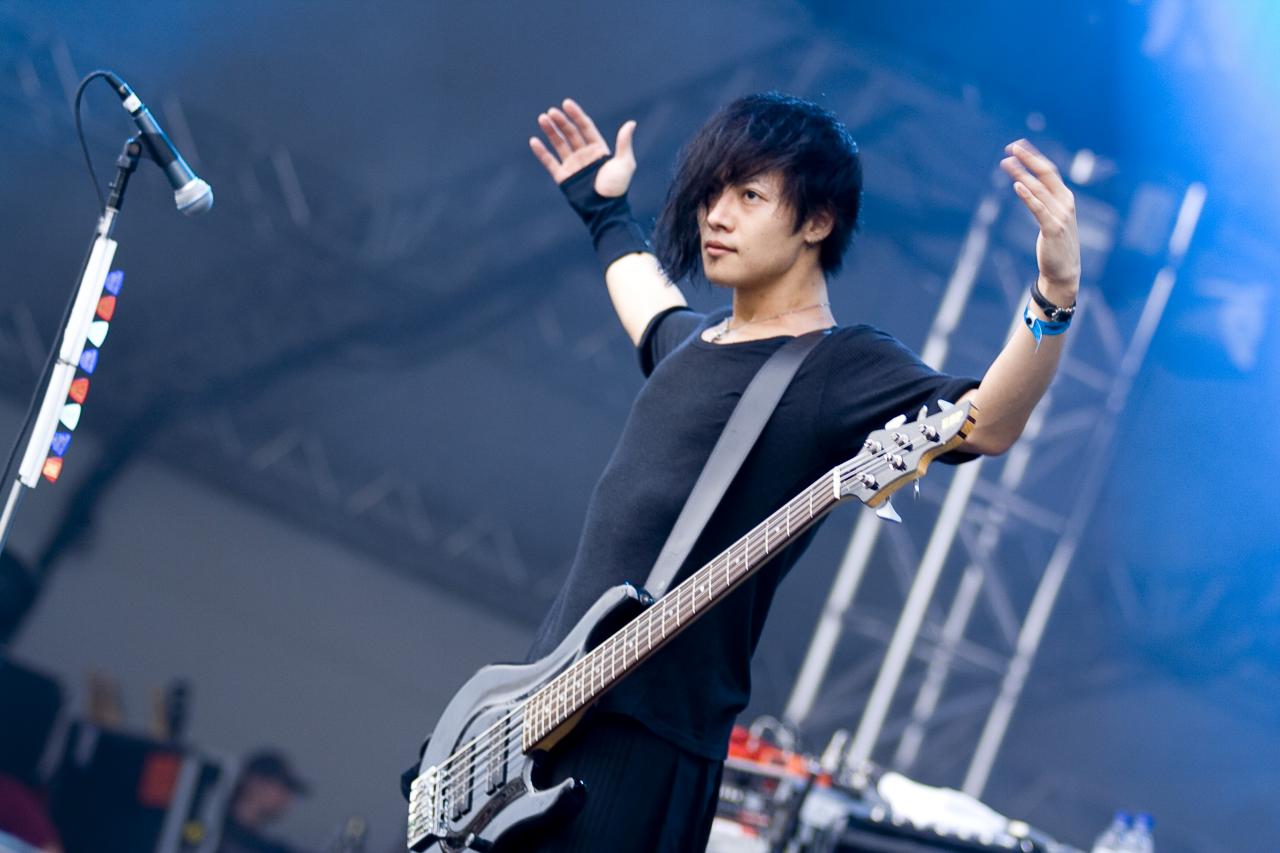Canadian producer, songwriter, and recording artist Daniel Victor revolutionized the music industry with Neverending White Lights: “a groundbreaking collaborative project, band, and conceptual album series”. In November of 2011 Victor and NWL released a third studio album, Act III: Love Will Ruin. This was followed by the long-awaited album Neuromancer, through his side project Black Ribbons, in October of last year.
DarkMedia was privileged to sit down with Daniel to discuss the evolution of Neverending White Lights, songwriting techniques, and his struggle to maintain his creativity in the face of adversity and personal demons.
How would you describe the music of Neverending White Lights for those who may have not have heard it before? How did you choose the name and what does it mean to you?
Our music is hard to categorize. NWL is a collaborative project of conceptual albums that feature the likes of many guest artists, and as such it naturally lends itself well to exploring and pushing new territory within itself. It’s one thing to grow as a band or artist, it’s another to allow different voices to help shape the songs. That has created a diversity in our sound, but as I’ve produced and performed all the instruments, and written all the music, there is a consistency that rings throughout each release. I’m influenced by a lot of big, expansive sounding music, and I would certainly attach that vibe to our sound. To describe it to someone who hasn’t heard it? I would say maybe Cinematic-Goth-Rock-Melancholy.
The name came from some early lyrics I was writing. As I was flipping through pages of ideas I had written down in my sleep, I noticed the phrase ‘Neverending White Lights’. Which was my way of describing the souls of humans. The ghost inside us. When we die, the human body stays behind, but the energy escapes, perhaps floating around in another dimension around us. This ‘light’ is created from our spirit, and it never dies. We are essentially made of Neverending White Lights.
Where did the idea of Love Will Ruin come from? As the third act (following Act 1: Goodbye Friends of the Heavenly Bodies and Act 2: The Blood and the Life Eternal) how does it build upon the other two albums?
Love Will Ruin was my first attempt at a love album. My first two records (Act 1 & 2) were each about more spiritual topics, the first leaning towards existence, angels, and our place in the universe, and the second dealing with eternal life and stories within that concept. For my third album, I wanted to finally explore more emotional topics, but I wanted to make sure it was an album about Tragic Love – because that’s what inspires me. So the stories on this album deal with all sorts of love stories from a sad and tragic perspective. Stories about relationships falling apart in different ways, the longing you have for someone you lost and will never get back, faded memories of those we loved that are gone forever, never getting to tell someone you loved them, dying in love, etc. I think I was able to capture a lot of emotion in this new album. And I’ve written so much material on this topic now, I seem to be stuck in it. It’s an addicting topic.
How have you grown from the inception of NWL up until now? Is it where you expected to be?
As a producer, writer, and performer I’ve grown considerably. Listening back to my older work is almost unbearable for me on some terms because of how I’ve progressed personally. I’m very content that NWL has been able to achieve what is has by breaking into mainstream radio and video in Canada, and still being an independent project that is a far cry artistically than a lot of its contemporaries. I’ve also savoured the praise and awards, not because it validates my work in terms of actually being what it says on those trophies, but because in toiling for years and years to make something that nearly killed me, it at least gives me something to show for it that means people listened. It reached an audience. It’s a breath of air to know that, and it keeps me working. As for my future, I still feel I haven’t even started yet. I haven’t made an album I’m truly proud of and consider my ultimate work. I think I’ll always be searching for that. I usually finish making albums, videos, or songs then think ‘God, I can do better than this. What’s wrong with me.’

You’ve said that this making this last album was a challenging process, but one that taught you valuable lessons. What lessons did it teach you and what, if anything, would you have done differently?
I learned a lot about the music industry in making this album. I watched the industry crumble around me in the late 00’s much worse than it had before. The way the internet has changed music has affected anyone in the game the past 10 years, and it hasn’t gotten any better. My label partners did the unartistic albeit typical business process of comparing my albums, not musically, but in sales. Which I understand. But that messed me up because it told me that my better work sold less, and they made me figure out why, believing it had something to do with my songs or ideas. No matter what type of music you make, you are at the mercy not only of the team of people who help you release it, but of the listeners who hear it, if they even get to hear it. If radio doesn’t play my single, no one gets to decide if they like it. If people don’t blog about it, or spread it and it goes nowhere does it mean your a failure? Did you get a chance? It’s increasingly more depressing to release music nowadays because there is SO much content out there it almost makes no sense if not for personal reasons, certainly not for financial. So I learned not to let people get inside my head. I learned not to trust everyone. And I learned to make the music truest to my heart. And I learned I can’t do anything unless I’m happy with it, whether my audience will like it or not. When I’m gone, my legacy will be here and I have to be happy with what I left behind.
If I could go back and do it again, I wouldn’t have taken four years to make it. I put my trust in people who said it would be OK to wait, and that process only made things worse. Then the album turned into a nightmare. I had to save it as best I could before I released it, and I did my best. It’s not perfect, but it’s a good closing to the trilogy and if anything there are a few songs that standout as some of the best of my career.
How do you write the lyrics for your songs? Is it a gradual process with a lot of editing, or something you do very quickly after being inspired?
I always write lyrics last. The music comes first. I’ll sing some melodies over top with whatever naturally flows out, then listen back and write down the words that catch my ears. Then I’ll transform that into a piece that relates to the concept of album I’m working in, and build backwards, sometimes eventually starting completely over from scratch. It’s like I need a starting point to to paint, but then I can change the colours afterward so they mean what I want. That process can take 20 minutes (The Grace) or 3 years (Starlight). On average, I would say it’s hours of properly putting something together that feels right and sits right in the music. Lots of late nights sitting and thinking and erasing and re-writing. It rarely comes out in one shot, all though there have been instances where I just wrote something out completely and it worked perfectly.
When can we expect to see Love will Ruin Part II? How will it tie into Part I?
Originally, Act 3: Love Will Ruin was supposed to be a double album, Part 1 having come out last November. Unfortunately, the 2nd half of the album was destroyed in a studio disaster. We had a massive flood which wiped out most of our equipment and hard drives. Though I have some older demos of the songs on some other devices, most of the content was lost. It felt to me like this was a sign. After struggling with the last record in many ways, I feel that perhaps it would make the best sense to leave the music that was lost to the earth, and start fresh on some new material. Hence, Act IV will be the new album. A brand new start with a fresh concept as the first trilogy comes to a close.
In previous interviews, you mentioned your struggle with OCD and depression, and a desire to avoid medication that limits creativity. How is that going for you now? Where do you believe creativity comes from?
I still struggle from those things daily, and it makes life more difficult to work through. Which I also think makes sense in a way because I like testing myself, to see if I can take it. And where my breaking point is. I don’t know if that’s healthy but it can make us stronger sometimes. I choose not to medicate because I don’t want to numb myself from the depths of my emotions. It is that source which fuels me creatively. I wrote the most when I’m sad, lonely, or anxious, so I don’t want to kill that off, even though it makes everything more difficult. I believe my creativity comes from having a very sensitive, albeit specific mind to inspiration. When I hear music I love, I get ideas. When I see things I love, I get ideas. When I feel things I love, I get ideas. It all sparks me to want to write, record, and perform. The ability to be able to do so is definitely a blessing I was born with, and I’m thankful for it.

How much personal experience can be found hidden between the lyrical lines of Love Will Ruin? As an experienced musician and artist, do you believe it’s possible for an artist to leave himself completely out of his creation?
There is an fair amount of personal experience on Love Will Ruin. I drew from past love, current love, and far off places in my heart that allow for the ‘sting’ of emotion. I’m not one to make personal records. Act 1 & 2 were fairly vague and dealt more with my need to find my place in the universe, as a soul, and focused on questions of existence and spirituality. The later focused on eternal life and the idea of love and other concepts on that plane. With Act 3, I wanted to tell stories in different ways, so they’re obviously not all entirely a reflection of my personal life, but I told the stories using my past experiences. A few songs in particular, such as ‘The Greatest One’ and ‘Starlight’ are about very specific situations and people in fact. Then tracks like “The Hereafter”, a love story at the apocalypse, are stories. I think one day soon I will make an entire album that is very personal, I have a few songs I’ve been holding on to and I’m just waiting for the right album to release them on.
Despite NWL being a one-man band, you’ve also put together exceptional collaborations. How do you choose who you want involved in a project and who would you like to work with in the future?
I usually go directly to those voices who strike a chord with me. I’ve featured some of my most favourite singers in the world on the past few albums and I’m exceptionally proud to have worked with them. I initially made a wish list for Act 1 and contacted as many of the artists as I could. Most of them were more underground and indie acts so they’re were somewhat within reach. For the bigger names it was more difficult, there’s always more red tape with managers and record labels protecting them. But the organic and grassroots nature of the project made them receptive to it. There are some very notable names I would love to work with, of course considering I usually back all my work myself, including expenses, the figures for some of my favourites are out of reach, at least for the time being. Most NWL features do it for the love of the music, and it’s so refreshing to have learned that about many of my favourite acts – that they were in it for the right reasons – making great music. I’m still hoping to work with a few names, such as Radiohead, Sigur Ros, Rufus Wainwright, Julian Casablancas, Antony and the Johnsons, Zola Jesus, Morrissey, Bat For Lashes, Robert Smith….I mean, not only would the list go on for ages, every week there are new acts I discover that I fall in love with.
Many of your songs revolve around themes such as hope in the darkness, searching for meaning, and finding both. Do you set out deliberately to convey a certain message in your music, do you hope your fans will take something specific from it, or do you prefer to leave it all to interpretation?
The messages I convey are directly from the stories in my heart. It’s like painting a picture. When the albums are done, they reflect the things I wanted to write about personally. If they succeed in fulfilling that goal, then I go on to release them to the world. When people listen they are free to interpret those pieces in any way they like. If fans ask me what a particular song is about I will tell them. Sometimes it changes the meaning for them, sometimes worse, sometimes for the better. But there’s no one particular message I want to relay across all the albums. If anything, the consistent theme and message that has naturally surfaced is that of longing and displacement from the world we know.
What bands/artists give you inspiration? What is on your current (music) playlist?
Every year I post a list of favourite songs on our website of all the tracks I fell in love with during the course of those 12 months. I encourage our fans to check those out and immerse themselves in some amazing music. They’re available on our Facebook page as well. My current end of summer playlist includes: French Kicks, The Dream, The Drums, Charli XCX, Crybaby, Phedre, Tesla Boy, Twin Shadow.
What’s next for you?
 I’m trying to build my label by signing and producing some up and coming acts. I recently signed a young artist from Vancouver called Bed of Stars. He has one of the most amazing sounding voices I’ve ever heard in my entire life. We’ve recently finished his debut EP and will be releasing it early next year. I’m working on a couple collaborations in the Hip-Hop genre as well with J Diggz (We Are Not Heroes) and D-Sisive (watch for a single coming this fall). I’m also releasing the highly anticipated (by NWL fans) Black Ribbons album, which is my personal side project. It’s a pop-noir-synth-rock album that I recorded a few years ago and it’s a favourite with those who have heard it. It will get a proper release on digital, CD, and vinyl in October.
I’m trying to build my label by signing and producing some up and coming acts. I recently signed a young artist from Vancouver called Bed of Stars. He has one of the most amazing sounding voices I’ve ever heard in my entire life. We’ve recently finished his debut EP and will be releasing it early next year. I’m working on a couple collaborations in the Hip-Hop genre as well with J Diggz (We Are Not Heroes) and D-Sisive (watch for a single coming this fall). I’m also releasing the highly anticipated (by NWL fans) Black Ribbons album, which is my personal side project. It’s a pop-noir-synth-rock album that I recorded a few years ago and it’s a favourite with those who have heard it. It will get a proper release on digital, CD, and vinyl in October.
What is the best way for fans to support you and NWL?
Tell all your friends. Show them your favourite songs. Buy the albums when they come out. Send us your messages. Follow us on Twitter and Facebook. Come to our concerts. NWL can not exist without fans who support us, and we’re living in a time where a lot of acts are bowing out of the game because they simply can’t afford to continue onward, or they feel they don’t have the love and respect from anyone. I’ve lost a few of my favourite bands because people ignored them or stopped caring. I want to put together legions of people who understand our musical style, aesthetic, and taste in everything from literature, to art, to film, to philosophy. I hope to eventually find the time to build a community like this where we can all share our ideas together. But first, there is more music to make.
What inspires you?
Lately? The fantastic movie Synecdoche New York. Some exciting new singles from Grimes, Bluebell, and Flotation Toy Warning. The promise of some new talent I’m working with in the studio. The goals and plans to take NWL over to the US and overseas. The concepts I’m developing for new music videos. The personal struggle for happiness. And of course, the new music I’ve been writing for Act IV.
You can find Daniel Victor on Facebook, Twitter at @iamNeverending, or on the official website for Neverending White Lights and Black Ribbons.
(All interviews are the exclusive property of DarkMedia, and may not be reproduced or shared without permission, excepting links to the interview.)
















Comments are closed.